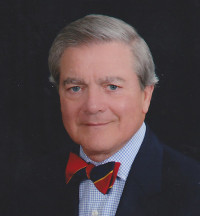Rev. Dr. George B. Wirth: Atlanta Interfaith Manifesto encourages us to become “a city that is not too busy to relate”
 When our Steering Group of 35 Interfaith leaders from all across Atlanta re-discovered the Minister’s Manifesto, published on Sunday, November 3, 1957 in the Atlanta Journal and Atlanta Constitution, something significant happened. We realized that the 80 white ministers who signed that Manifesto sixty years ago were standing up and speaking out for racial justice and equality. We also found out later that Rabbi Jacob Rothschild from The Temple had helped to write the Manifesto, and remembered that all of this occurred while William Hartsfield was our mayor, a visionary leader who described Atlanta as “a city too busy to hate”.
When our Steering Group of 35 Interfaith leaders from all across Atlanta re-discovered the Minister’s Manifesto, published on Sunday, November 3, 1957 in the Atlanta Journal and Atlanta Constitution, something significant happened. We realized that the 80 white ministers who signed that Manifesto sixty years ago were standing up and speaking out for racial justice and equality. We also found out later that Rabbi Jacob Rothschild from The Temple had helped to write the Manifesto, and remembered that all of this occurred while William Hartsfield was our mayor, a visionary leader who described Atlanta as “a city too busy to hate”.
This historical background served as the inspiration for the Atlanta Interfaith Manifesto which was published in our local newspapers last fall, signed by 75 religious, academic, business, civic and political leaders from all walks of life throughout metro-Atlanta. Since then, more than 600 people have added their names to the Interfaith Manifesto, which is “a statement denouncing religious bigotry and calling for interfaith cooperation.” As you may have already heard, the four basic principles of this Manifesto are:
-To advance interfaith cooperation, respect, and accommodation for diverse religious and secular identities
-To marshal religious diversity and respond to human rights challenges with innovative solutions
-To celebrate Atlanta’s broader significance as a beacon to this country and the world regarding civil, human and religious rights
-To take a stand and speak out against acts of hatred and intolerance that threaten the foundation of our society
The Atlanta Interfaith Manifesto of 2016, hearkening back to Rabbi Rothschild’s involvement in writing the Minister’s Manifesto in 1957, was initially drafted by a Muslim and an Eastern Orthodox Christian from the Interfaith Youth Core in Chicago who have served as consultants to our movement here in Atlanta. Moreover, the Atlanta Interfaith Manifesto has become a guiding light to the numerous interfaith organizations in our city which embrace a similar vision as we promote cooperation and a sense of unity among so many different faith traditions.
Back in the late 1990’s, I heard a sermon at Chautauqua Institution in New York delivered by Dr. Joseph Hough who was then the President of Union Theological Seminary in New York City. As he looked out over the 4,000 worshippers gathered together in the amphitheater, he said in closing that the future of the 21st century would largely depend on the different world religions learning to respect one another and to live together in peace. That statement caught my attention and it reminded me of something that Mark Twain wrote with tongue in cheek in 1896:
“So concerned was I about the discord and violence among God’s creatures, that I decided to take the matter in hand. So I built a cage and in it, I put a dog and a cat. After a little training, I got the dog and the cat to the point where they lived peaceably together. Then I introduced a pig, a goat, a kangaroo, come birds and a monkey. And after a few minor adjustments, they learned to live together in harmony. So encouraged was I by this success, that I added an Irish Catholic, a Presbyterian, a Jew, a Muslim from Turkestan and a Buddhist from China, along with a Baptist missionary I had captured on the same trip. And in a very short while, there wasn’t a single living thing left in the cage.”
-Mark Twain, “Man’s Place In The Animal World” 1896
Now we know that Mark Twain was a cynic, so we might expect that kind of attitude from him, despairing about human nature and our inclination toward discord and dissension. But with the intolerance, bigotry, and violence that has been unleashed across America and throughout the world thus far in the 21st century, who of us could claim that we are making real and substantial progress toward religious reconciliation and healing among the nations?
That is why the Atlanta Interfaith Manifesto is needed now more than ever before – to lead us toward embracing a new theme: “A city that is not too busy to relate” – across religious and racial barriers, across economic and ethnic divisions, across class and cultural differences. That, I believe, is the compelling vision which God has called us all to affirm: The Beloved Community which Martin Luther King Jr. dedicated his life to creating which takes us beyond being a city that is too busy to hate.
So let us join hearts and hands and voices together as we stand up and speak out for justice, reconciliation, unity, and cooperation as people of faith while respecting those who do not adhere to any form of religion. If not now, then when? If not here, then where? And if not we ourselves, then who else will do it? The time has come for the Atlanta Interfaith Manifesto to become a guiding light leading us in the right direction.
The Rev. Dr. George B. Wirth
Pastor Emeritus, First Presbyterian Church
